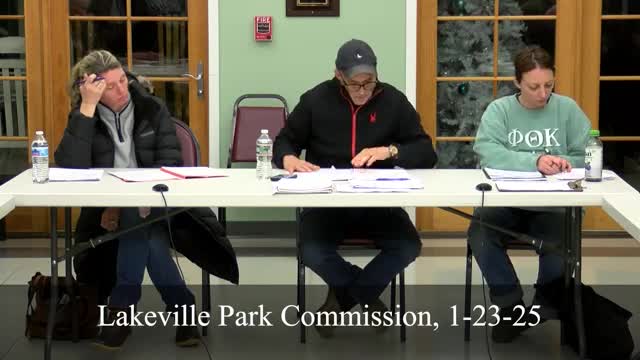Commissioners press town leaders on parks’ enterprise fund, payroll and capital options
Get AI-powered insights, summaries, and transcripts
Subscribe
Summary
Town staff explained that Lakeville’s parks operate as a voted enterprise fund under M.G.L. c.53F½ but currently receive subsidies from the general fund; commissioners discussed options for de-enterprising, payroll allocation for a maintenance worker, and capital funding paths including free cash and capital-expenditure committees.
The Lakeville Park Commission asked town officials on Jan. 23 to clarify how the parks’ enterprise fund works and what changes de-enterprising would bring to day-to-day operations, payroll and capital planning.
Town Accountant Mike Dallas and Town Manager Andrew explained that the parks are a voted enterprise fund under Massachusetts law (M.G.L. c.53F½) but are not fully self-sustaining. Dallas said an enterprise fund is primarily an accounting mechanism that keeps revenue and expenses separate from the general fund and typically ranks as self-supporting through user fees — a sewer fund is a common example. He said Lakeville’s parks receive transfers from the general fund to cover operating shortfalls and capital needs.
Commissioners raised several recurring operational questions: who pays the salary when a Department of Public Works employee works exclusively for parks; whether parks can solicit donations; and how capital projects (for example, Loom Pond maintenance or restroom upgrades) would be funded. Dallas said payroll for a person who is 100% assigned to parks should be budgeted in the parks’ fund or the parks could reimburse the general fund via indirect-cost charges. He recommended that a staff member who works entirely for parks be hired and budgeted as a parks employee to avoid repetitive internal transfers. Dallas said retained earnings in the parks’ enterprise account are about $40,000 and that free cash — the town’s year-end available funds — becomes available after books close in August or September.
The commissioners also discussed de-enterprising (moving parks into the general fund). Dallas said that administrative processes would largely remain: the commission would still prepare a budget and meet with town staff during budget season, but the parks budget would be incorporated directly into the general-fund operating budget rather than being shown as a stand-alone enterprise column. He warned that whether parks remained as an enterprise fund or were de-enterprised, the parks budget could still be reduced if the town needed to make cuts. He added that borrowing for enterprise projects can be split between enterprise and general funds depending on the capital plan and approvals.
Other subjects included alternative revenue channels: revolving accounts, gift/donor accounts and “friends” groups. Dallas said some towns maintain donor funds or revolving accounts to accept contributions, but municipalities often require a formal gift account or a friends-of-parks nonprofit to solicit donations for capital projects; the commission previously was told it could not solicit brick donations directly without a designated gift account or friends group.
Why it matters: Commissioners said the current arrangements create operational complexity — from who handles weekend problems (lighting, bathrooms, on-call needs) to whether retained earnings are sufficient for foreseeable repairs. The town manager and accountant committed to additional conversations and suggested that the commission prepare capital requests (with cost estimates) for the town’s capital-expenditures process and town meeting consideration.
Ending: No formal policy change was adopted at the Jan. 23 meeting. Staff asked the commission to prepare prioritized capital requests and to consider whether to reclassify a maintenance employee as a parks employee or to formalize indirect-cost charges that reflect the employee’s time.
